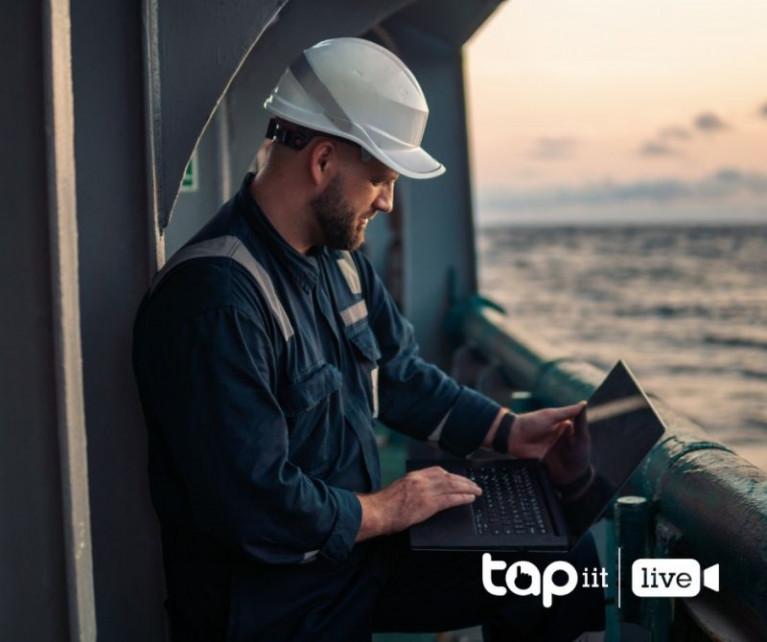Displaying items by tag: Training Package
Seafarers left stranded by the coronavirus pandemic and facing other challenges is where a UK headquartered maritime tech training company is launching a new package of mental health courses for those working at sea.
The launch by Liverpool based Tapiit Live takes place today on the eve of World Mental Health Day, (tomorrow) Saturday, 10th October.
The sessions will be the first ever mental health courses to be live-steamed both onshore and offshore. The vessel based training is being made possible thanks to Tapiit Live’s new industry changing deal with satcoms provider Inmarsat which enables live-stream training to nearly 10,000 ships, an innovation thought to be 10 years in the future. In addition, the courses will be live-streamed onshore direct to companies training facilities and seafarers homes.
Tapiit Live’s CEO Richard Turner, a former seafarer and managing director at Shell Ship Management, said the courses will be delivered by the clinical psychologist Dr Rachel Glynn-Williams, from Liverpool-based Seaways Psychology Services and aim to prevent and tackle poor seafarer mental health. The issue has been brought into sharp focus by the coronavirus crisis which has left an estimated 300,000 seafarers stranded on ships unable to return home after their contracts have ended due to travel restrictions. This has led to huge concerns over seafarers wellbeing and mental health.
Richard said the new package is titled ‘Mental Wellbeing at Sea at Times of Uncertainty’. He said the one-hour course is delivered in a group situation in a mess or training room, with participants sent workbooks to complete. The courses are available to ship owners, operators and ship management companies worldwide with tailored courses for officers and ratings.
Courses begin with Dr Glynn-Williams asking about the welfare of those on board and includes three minutes of breathing space techniques for dealing with anxiety.
He said: “Seafarers often live in cramped conditions, which we know can impact on mental wellbeing, so the main point of the course is to get people out of their cabins and into mess rooms where they can interact.
“The important difference in what we do is that this is not a webinar or e-learning but we are trying to create a classroom environment where the lecturer engages with participants every five minutes and they feel able to interact. Nothing beats classroom style learning and while e-learning is effective, live-streaming is better as it ensures seafarers can actively engage with the tutor in real time or via private chat.”
Dr Glynn-Williams then remains online for up to an hour after the class has ended so that seafarers can approach her individually if they wish to. Although the course is not intended as a clinical session, she can refer individuals to a network of further mental health assistance should she feel it is needed. A follow-up contact is made by Tapiit Live two months later to check on progress and offer further support to seafarers.
Tapiit Live also offers a Welfare for Leaders course that recognises that strong mental health should come from the top. The firm's project manager Lee Clarke, another former seafarer, is helping manage the courses. He said he is bringing his own experience of life at sea to the business and recognises the importance of strong mental health.
He said: “Seafarers are a very resilient community and mental health was rarely talked about during my seafaring career. As a cadet manager for a number of years, I lost a number of cadets to suicide, which stemmed from not talking and communication completely shutting down.
“We want to break down these barriers, which is a massive step for seafarers, and it’s been reassuring to see them embrace this already. My longest stint at sea was six months so I can’t imagine what some of these seafarers are going through with crew changes taking so long, sometimes well over a year, and maritime nations closing their borders. These people are the pillar of our communities, delivering everything so that we can fill our cars with petrol or go into Tesco and get our groceries while we’ve been at home in isolation, so it’s hugely important that we concentrate on their wellbeing.”
The ‘uncertain times’ course was delivered to the crew of one ship in military waters, where the use of camera equipment was restricted. Tapiit Live arranged for a Nokia 3310 to be delivered to the vessel and Dr Glynn-Williams presented the content to the group over the phone.
Clarke said: “Both we and the captain were determined to get the course delivered to these seafarers and, although they could not see Dr Glynn-Williams, the conversation that came from the course content was amazing. Those seafarers are still on board and the captain has reported seeing a difference in his crew, who are now using the mess room more, practising the breathing space activities and using their workbooks.”
Outside mental health Tapiit Live runs a wide range of training packages to enable seafarers to learn wherever they are in the world, without a fluctuating signal, removing 80pc of the normal cost of onshore training usually taken up by accommodation, travel, expenses and venue hire. The courses include toolbox talks, maritime English, risk assessments, security and safety culture.





























































